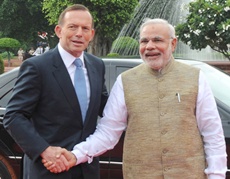Australia set to sign uranium deal with India
05 Sep 2014
India and Australia are set to sign a nuclear cooperation agreement, which will allow power-starved India to source uranium to feed its 20-odd and upcoming nuclear power plants.
 Australian Prime Minister Tony Abbott today said he hoped to sign a deal to sell uranium to India for peaceful power generation by Friday evening.
Australian Prime Minister Tony Abbott today said he hoped to sign a deal to sell uranium to India for peaceful power generation by Friday evening.
"Prime Minister Narendra Modi and I will sign nuclear cooperation agreement, which will allow Australia to sell uranium to India for civil nuclear purposes," Abbott said on Friday.
Negotiations for the civil nuclear cooperation agreement, under which Australia will supply uranium to India for power generation on a long-term basis, began during the UPA regime when John Howard was the prime minister of Australia.
A deal, however, has been held up over India not being a member of the NPT, although work on an India-Australia agreement has been underway.
Australia, which has 40 per cent of the world's known uranium reserves, lifted a long-standing ban on selling uranium to energy-starved India in 2012.
India operates 20 relatively small reactors across six sites with a combined capacity of 4,780 MW, or 2 per cent of its total power capacity, according to the Nuclear Power Corporation of India Limited. The government proposes to increase its nuclear power capacity to 63,000 MW by 2032 by adding nearly 30 reactors, at an estimated cost of $85 billion.
Reports, meanwhile, said Indian companies have already shown interest in uranium mining in Australia. Last week, Parag Shirname, trade commissioner (South Asia) of the government of Queensland, Australia, said Indian companies have also visited the country to scout for uranium mines.
Queensland which has the world's third largest uranium reserves, allowed commercial uranium mining in July, ending a 25-year ban.
Meanwhile, the minister of state for finance, Nirmala Seetharaman, said Australian mining companies have also shown interest in investing in India. "There are eight mining applications from Australian companies currently pending. We will clear them as we want to provide an environment for doing business without difficulty," she said.
Abbott said, India has promised that any uranium it buys from Australia will only be used to produce energy, not to build nuclear weapons.
The nuclear safeguards agreement to be signed by the two countries also stipulates that India must only use the uranium for peaceful purposes that adhere to recognised international safety standards.
Australia also expects India to meet the highest global standards of radiation and nuclear safety.
The agreement will prove controversial because India has refused to sign the Nuclear Non-Proliferation Treaty despite possessing an arsenal of atomic weapons.
While Abbott has stated that it's not Australia's job to tell India how to conduct its own business, it is not clear how the agreement will be enforced as the agreement must first be considered by Australia's parliamentary Committee on Treaties before getting the stamp of approval.
India is Australia's fifth-largest export market, with energy resources making up the lion's share of its imports. Last year. India bought nearly $5 billion worth of coal from Australia.


















